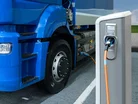Germany Builds Nationwide Fast-Charging Network for EVs

Germany is embarking on a transformative journey to enhance its transport sector and significantly reduce greenhouse gas (GHG) emissions by building a nationwide fast-charging network for heavy-duty EVs.
The ambitious project, Power to the Road, is a cornerstone of Germany's strategy to decarbonise its transport sector by 2045, aligning with broader European Union (EU) climate goals.
Tackling greenhouse emissions and transport sector challenges
As Europe's largest economy, Germany has made substantial progress in reducing GHG emissions, reaching their lowest levels in 70 years in 2023.
Despite this achievement, the transport sector remains a persistent challenge, consistently failing to meet climate targets.
According to Germany's Environment Agency (UBA), commercial vehicles, particularly heavy long-distance road haulage powered predominantly by diesel, account for around a third of the transport sector's GHG emissions.
While truck carbon dioxide (CO2) emissions per kilometre have decreased by 8.4% since 1995, the overall rise in freight transport has resulted in a 21% increase in total CO2 emissions from the sector. This highlights the urgent need for initiatives like Power to the Road to transition heavy road haulage to greener energy solutions.
The Power to the Road project
Power to the Road is critical to Germany's transition from heavy road haulage to green energy.
"Our goal is to let trucks only run on green electricity," states the country's Economy Minister, Robert Habeck.
Echoing Minister Habeck’s sentiment, Volker Wissing, Germany's Transport Minister, says: "A powerful charging infrastructure forms the backbone of tomorrow's climate-friendly mobility and logistics. We are launching a real mammoth project with the fast-charging truck network."
Power to the Road is aimed at creating extensive and user-friendly fast-charging infrastructure along highways, facilitating the rapid adoption of electric trucks.
Approximately 350 locations will be equipped with truck-compatible fast-charging stations, with public tenders for around 130 planned locations to be issued later this summer.
EU regulations and support
The German initiative aligns with the EU's global efforts to reduce emissions.
In July 2023, the Council of the EU passed a law mandating the installation of fast-charging stations every 60 kilometres along highways by the end of 2025. These stations must have a total output of 400 kW for cars and vans and 600 kW for heavy-duty vehicles.
The new law also requires that charging stations be interoperable, ensuring compatibility with all EVs, regardless of manufacturer.
The EU aims to have one million public charging points by 2025 and three million by 2030, supporting the growing market for EVs. This legislative push is part of the Fit for 55 goal, which seeks to reduce emissions in the EU by 55% or more by 2030.
Germany's growing charging network for EVs
In addition to Power to the Road, Germany is working on a comprehensive charging network that includes 9,000 High Power Charger (HPC) fast-charging points for electric cars and light commercial vehicles.
The federal government is investing approximately US$2.4bn (€1.9bn) in this network, with the charging points expected to be operational by 2026.
Germany had already surpassed one million battery electric vehicles (BEVs) on its roads as of December 2022. This growing infrastructure supports the increasing number of EVs and ensures that the country is well-prepared for a future dominated by sustainable transport solutions.
Germany's commitment to building a nationwide fast-charging network for heavy-duty EVs marks a significant step toward decarbonising the transport sector. The Power to the Road project, supported by EU regulations and substantial federal investment, highlights Germany's leadership in the transition to green energy.
As the country continues to expand its EV charging infrastructure, it sets a powerful example for other nations striving to achieve their climate goals and embrace sustainable mobility solutions.
**************
Make sure you check out the latest edition of EV Magazine and also sign up to our global conference series - Sustainability LIVE 2024
EV Magazine is a BizClik brand


